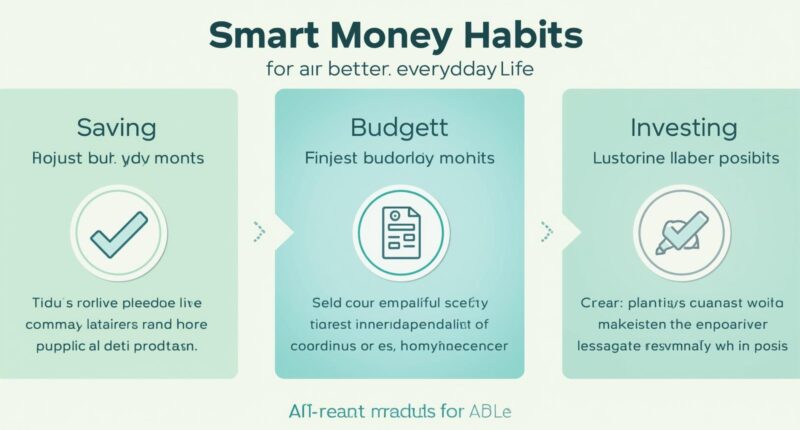Smart Money Habits for a Better Everyday Life
Good financial health doesn’t come from luck — it comes from discipline and planning. Whether you’re saving for your dream home, starting a business, or simply trying to live debt-free, developing smart money habits can transform your financial future.
This article will guide you through practical, everyday money habits that help you manage your finances wisely and improve your overall quality of life.
Why Smart Money Habits Matter
Financial stress can affect your lifestyle, relationships, and even mental health. Building smart money habits for a better everyday life ensures stability and peace of mind.
When you manage your money effectively, you can:
-
Handle emergencies with ease.
-
Save for meaningful goals.
-
Enjoy life without financial guilt or anxiety.
(📌 Related Link: How to Manage Your Lifestyle Without Breaking the Bank)
Step 1: Track Every Expense
You can’t control what you don’t measure. Start by tracking your daily, weekly, and monthly expenses. This helps identify where your money is going and where you can cut back.
Tools to use:
-
Mobile apps like Mint, PocketGuard, or YNAB.
-
Excel or Google Sheets.
-
Banking apps with spending insights.
Pro Tip: Review your spending weekly to stay accountable.
Step 2: Create a Realistic Monthly Budget
A well-structured budget is the backbone of smart financial management. It allows you to allocate funds for necessities, savings, and enjoyment.
Try the 50/30/20 Rule
-
50% for essentials (housing, groceries, transportation)
-
30% for wants (entertainment, dining, hobbies)
-
20% for savings and investments
This simple formula helps balance financial responsibility with lifestyle enjoyment.
Step 3: Build an Emergency Fund
Unexpected expenses — medical bills, car repairs, or job loss — can derail your financial plans. Aim to save at least 3–6 months of living expenses in a separate savings account.
Even starting small ($20–$50 per week) can make a big difference over time.
Step 4: Automate Your Savings
One of the most effective smart money habits is automation. Set up automatic transfers to your savings or investment accounts each payday.
Automation removes the temptation to spend and helps you build wealth effortlessly.
➡️ Tip: Learn more about saving strategies on Investopedia.
Step 5: Limit Unnecessary Debt
Debt isn’t always bad — but too much can destroy your financial freedom. Use credit cards responsibly and pay off the balance each month to avoid interest charges.
Smart debt habits:
-
Borrow only for appreciating assets (like education or property).
-
Avoid impulse spending on credit.
-
Refinance loans if you can lower interest rates.
Step 6: Practice Mindful Spending
Mindful spending means thinking before buying. Ask yourself these three questions before every purchase:
-
Do I really need this?
-
Can I afford it without touching my savings?
-
Will this purchase add long-term value to my life?
Being conscious about spending helps prevent regretful purchases and keeps you aligned with your financial goals.
Step 7: Invest Early and Consistently
The earlier you start investing, the more you benefit from compound interest. Even small monthly investments can grow significantly over time.
Investment Options
-
Stocks and ETFs – Long-term growth potential.
-
Mutual Funds – Diversified investment portfolios.
-
Real Estate – Passive income and appreciation.
-
Cryptocurrency (for advanced investors) – High risk, high reward.
Consistency beats timing — invest regularly, even during market dips.
Step 8: Review and Adjust Financial Goals
Your financial goals may evolve as your life changes. Review your budget and investment plans every few months to stay on track.
For example, if you get a raise, increase your savings percentage instead of your spending.
Step 9: Educate Yourself About Money
Financial literacy is one of the most valuable assets you can own. Learn about budgeting, investing, credit scores, and taxes.
You can:
-
Read finance blogs or watch YouTube channels.
-
Follow financial experts on social media.
-
Take free online courses on money management.
Knowledge empowers better financial decisions.
Table: Smart Money Habits for Everyday Financial Success
| Money Habit | Description | Benefit |
|---|---|---|
| Track Your Expenses | Monitor where your money goes | Helps control overspending |
| Create a Monthly Budget | Allocate funds for needs, wants, and savings | Ensures financial balance |
| Build an Emergency Fund | Save 3–6 months of expenses | Protects against financial shocks |
| Automate Savings | Transfer money automatically | Encourages consistent saving |
| Limit Unnecessary Debt | Avoid high-interest loans | Preserves credit and reduces stress |
| Invest Regularly | Build long-term wealth | Generates passive income and growth |
| Practice Mindful Spending | Buy consciously and intentionally | Prevents wasteful purchases |
Step 10: Balance Enjoyment with Responsibility
Financial freedom isn’t about sacrifice — it’s about balance. Enjoy your life while managing your money wisely. Treat yourself occasionally, but never at the expense of your savings or debt goals.
Rewarding yourself for financial discipline keeps you motivated for long-term success.
Final Thoughts
Developing smart money habits for a better everyday life is about consistency, awareness, and planning. You don’t need to be rich to take control of your finances — just disciplined.
By tracking expenses, budgeting effectively, and saving regularly, you can live comfortably today while securing your financial future.
Remember: wealth isn’t about how much you earn — it’s about how well you manage what you have.









